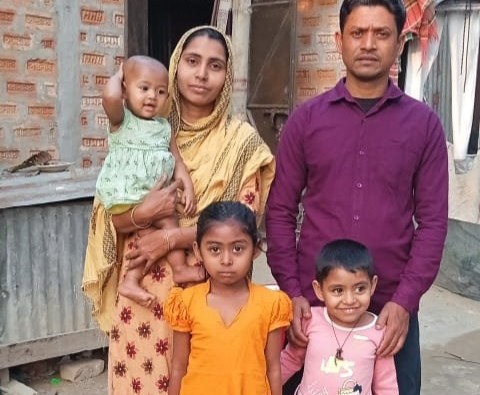AN environmental campaigner has set up a recruitment firm to supply seasonal workers for UK horticulture from climate affected countries in South-East Asia.
Naseem Talukdar, who also founded charity Projects Against Plastic (PAP), set up Regency Ltd due to labour shortages in farms across the country.
And hundreds have signed up to the scheme from countries such as Bangladesh, India and Sri Lanka – boosting productivity and produce delivered to food outlets in the UK.
Naseem, a second-generation Bangladeshi who helped launch a Plastic Free Ramadan campaign to reduce single-use plastic while breaking fast, said both parties benefited.
He said: “The farming industry in the UK benefits from employees with an agriculture-rich background, while the workers can earn a good wage to reinvest in their family and community.”
Prize-winning pickers
Several Bangladeshi labourers recruited through Regency have been named among the top ten strawberry pickers at one farm in the South-West – leading the owners to increase their intake of labourers from Bangladesh by tenfold.
Naseem, who is also director for social responsibility and sustainability for UK Curry Connect (UKCC), a campaign group to raise awareness of skills shortages in the Asian catering industry, believes it is about finding the right people for the right roles.
He said: “Bangladeshi workers are used to working on the ground, such as in the rice fields, which requires flexibility. They have the skills and experience for fruit picking.”
Pay it forward
Naseem’s forefathers came to the UK for work opportunities and in turn contributed to its economy and society.
His grandfather, who came from a small village in Bangladesh, served with the British Navy during World War II. And his parents were restauranteurs, who carried out charity and community work.
Naseem, who lives in Bristol, said: “I’ve seen how such opportunities can be beneficial all-round. I am indebted to those who came before me and would like to help others pursue a better life where possible.
“Workers can earn a good wage in the UK, allowing them to reinvest in their community back home, provide for their families and support their children’s education.”
Climate displacement
More than 30 million people were displaced internally by weather-related disasters during 2022, according to the international non-governmental organisation Internal Displacement Monitoring Centre (IDMC).
Phil Cole is senior lecturer in politics and international relations at the University of the West of England (UWE), with expertise in climate migration.
His book, Global Displacement in the Twenty-first Century, draws attention to those displaced due to environmental reasons.
He said: “These is little doubt that the challenge of climate displacement is one that will grow to dominate global politics in the future, and perhaps should be dominating it now.”
He believes the number of those displaced may be higher if slow-onset disasters, such as rising sea levels and salinization, which is the increase of salt concentration in soil and is among the most critical threats to agriculture and food security, are also factored in.
He said: “We know climate displacement is not a problem that lies in the future – it is already with us and has been impacting on millions of people for many years.”
Bangladesh has experienced more than 185 adverse weather events over the past 20 years. Seventy-five percent of the country is technically submerged.
Naseem, a UWE IT graduate who has won countless awards for his charity work, said: “We work with those affected by natural disasters, which impacts on their health and livelihoods.
“We are looking at holistic approaches to sustainability – from using plastic-free products to reducing waste to finding more sustainable agricultural methods.”
‘Climate refugee’
‘Climate refugees’ are people who must leave their homes and communities because of the effects of climate change and global warming.
But the UNHCR has warned against the term – concerned it could undermine the protection in place for political refugees.
There is currently some legal protection for those displaced by climate change where they are exposed to life-threatening risks or cruel, inhuman or degrading treatment.
But some human rights organisations believe the concept of refugee would help give the issue more urgency and provide more help for those displaced.
Professor Cole, who has written extensively on international migration and human rights, said: “For now they [refugees] are the focus of political attention in the sense of being seen as a threat to security and stability.
“Perhaps the concept of the climate refugee can change that focus to one of human rights and assistance for the displaced.”
Ethical practice
Regency’s mission is to ‘create an environment where every job seeker’s dreams are realised without fear of exploitation or extortion’.
It does not charge workers recruitment fees and is licensed by the GLAA (Gangmasters and Labour Abuse Authority).
It is also aligned with several of the UN’s Sustainable Development Goals (SDGs) and has created an ethical charter to ensure workers’ rights are protected.
Naseem said: “Sadly, there are many cases of unscrupulous third parties taking advantage of vulnerable people. This includes charging fees and mistreating workers.
“We deal with workers directly and are committed to being fair and transparent. We want to build a future where ethical recruitment practices flourish and the cycle of abuse is broken.”
Regency has a 100 per cent rate of workers returning home after their seasonal work is completed.
Naseem said: “I believe it’s a mutually beneficial and respectful relationship between the recruiters, farm owners and workers, with incentives to return the following year.”
Case study
Asadur Rahman is a father of three young daughters, aged one, four and six. The 40-year-old comes from Baniyachong in north-east Bangladesh, known as the largest village in Asia.
Rice paddies grow just once a year in the area and have been at risk of flash floods, which have been taking place earlier in the year – before crops can be harvested. I
Many farmers in the region have had to sell their cattle and other valuables, while others leave their homes for nearby towns to find manual work.
Following a bad season, Mr Rahman had to borrow from friends and family to put food on the table.
Community well
He said: “I was losing money and trying to survive that year. We cannot rely on harvests in Bangladesh with the extreme weather, including floods and storms.
“The seasonal work in the UK helps me to overcome the loss and is a far better rate of pay than I receive back home.
“It has helped me to get out of debt and fix my roof, which was leaking. I’ve also been able to pay off school fees and hire a private tutor to improve my children’s quality of education.
“I’ve also made contributions towards a community tube well so people can access fresh water for drinking, washing and cooking.”
Tube wells are manually operated and can lift water from about 30 metres beneath the ground.
Mr Rahman said he was well supported throughout the scheme and is set to return this summer.
He said: “I enjoyed my time in the UK and it was great to make friends with people from other countries and cultures.
“We worked hard but also had fun. The organisers have been supportive and this scheme gives us an opportunity to earn good money to reinvest in our family and improve our lifestyle.”



















